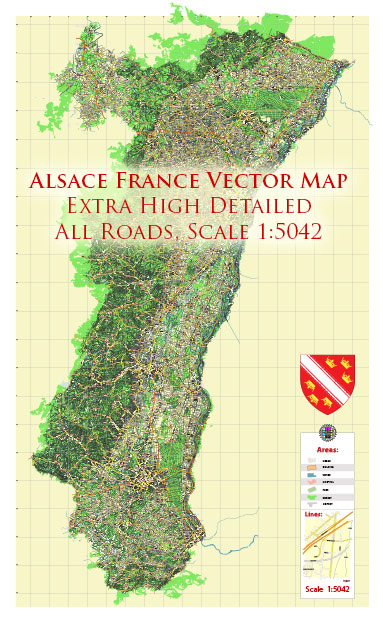Alsace, a region in northeastern France, is known for its rich natural resources and diverse landscapes. Some of the key natural resources in Alsace include:
- Vineyards: Alsace is renowned for its vineyards and is one of France’s primary wine-producing regions. The region’s vineyards yield a variety of high-quality wines, particularly white wines like Riesling, Gewürztraminer, and Pinot Gris. The fertile soils and favorable climate make Alsace an ideal location for viticulture.
- Forests: The region is characterized by extensive forests, which provide timber and other wood products. These forests are primarily composed of coniferous and broadleaf trees, and they play a crucial role in the timber industry, supporting both local construction and the production of paper and other wood-based products.
- Agriculture: Alsace has a strong agricultural sector, with fertile plains and fields supporting the cultivation of various crops. Traditional crops in the region include wheat, barley, maize, and various fruits. The fertile soils and favorable climate also make Alsace suitable for cultivating hops used in beer production.
- Water Resources: The region is rich in rivers and water resources. The Rhine River, one of Europe’s major rivers, forms the eastern border of Alsace and provides water resources for various purposes, including transportation, industry, and agriculture.
- Geothermal Energy: Alsace is known for its geothermal energy potential. The region has harnessed geothermal energy for heating and electricity generation. The town of Soultz-sous-Forêts, in particular, is home to a pioneering geothermal power plant that taps into the Earth’s natural heat.
- Mineral Resources: While Alsace is not particularly rich in mineral resources, there are some small-scale mining operations in the region that extract minerals such as gypsum, clay, and sand for various industrial applications.
- Biodiversity: Alsace is home to a variety of wildlife and plant species due to its diverse natural landscapes, which include forests, wetlands, and vineyards. Efforts to preserve biodiversity and protect the region’s natural heritage are ongoing, and several protected areas and nature reserves exist in Alsace.
- Tourism: The natural beauty and picturesque landscapes of Alsace attract tourists, contributing to the local economy. The region’s charming villages, historic towns, and scenic countryside offer opportunities for outdoor activities, cultural experiences, and wine tourism.
Overall, Alsace’s natural resources play a significant role in its economy and contribute to the region’s cultural and environmental richness. The preservation and sustainable management of these resources are essential for the well-being of both the local population and the broader ecosystem.


 Author: Kirill Shrayber, Ph.D. FRGS
Author: Kirill Shrayber, Ph.D. FRGS